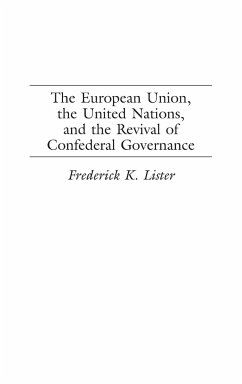Before it became a federation, the United States was briefly a confederation, a much looser union composed of states rather than of peoples. Unions of states to promote ecomomic well-being and to prevent war are now being revived. Mr. Lister analyzes modern confederalism, and how it is functioning in the single market of the Europen Union and how it might function if the collective security system of the United Nations could be carried out, as originally planned, by a confederal-style partnership of the world's independent states. Political scientists have traditionally classified voluntary polities as confederations, federations, or unitary states. But they have ignored the first of these classes, perhaps because Alexander Hamilton, wishing to mobilize support for the new federal constitution, discredited not only the United States Confederation but the whole class of confederations as a viable method of governance. More than 200 years later, confederation as a form of governance is still under a cloud. Yet it has been resurfacing, largely unrecognized for what it is, in the repertory of government. In the treaties of Rome and Maastricht and in the collective security system of the Charter, the European Union and the United Nations are already involved in forms of governance that are confederal in all but name. Lister's book describes confederal governance and how such unions of states differ from intergovernmental organizations on the one hand and federations on the other. Meticulously researched and carefully argued, it draws upon his five years of study of confederal unions from Ancient Greece through the 19th-century Germanic Confederation and the German Zollverein. But his book is not a history of confederations. Instead, it shows how long-term alliances sometimes evolve into unions of states and, in time, into communities of the peoples who live in those states. It also shows how the ties of confederal union have been institutionalized in modern times in the EU and how they might be institutionalized in a global collective security body.^L ^L Finally, the book stresses the urgency of moving in this direction because we shall face a very serious security problem in the next century. With the steady leakage of nuclear materials in Russia, the non-proliferation approach to controlling weapons of mass destruction appears to be breaking down. Lister argues that if and when governments are confronted with this looming problem, perhaps in the not-too-distant future, the confederal model may be the one that they will need to have updated and at their disposal.
Hinweis: Dieser Artikel kann nur an eine deutsche Lieferadresse ausgeliefert werden.
Hinweis: Dieser Artikel kann nur an eine deutsche Lieferadresse ausgeliefert werden.








